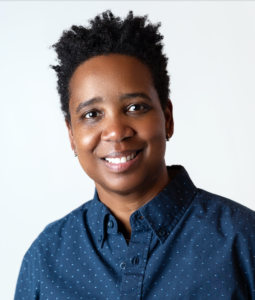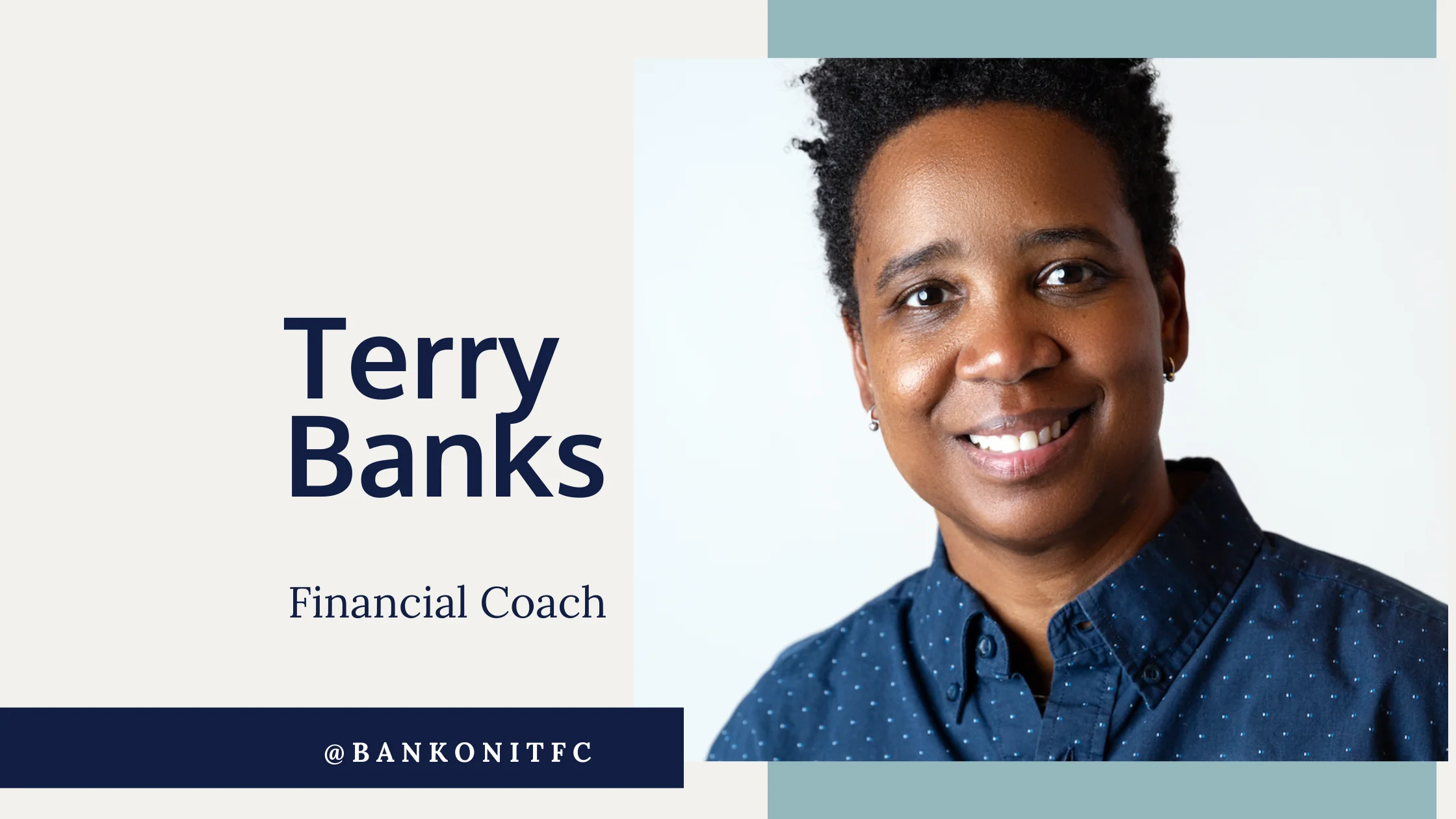“When we shift from being consumers to savers and investors, the power really comes with time.“
Terry Banks
I met Terry in January of 2021 through an Acadium apprenticeship, where I was looking to provide my services to businesses in exchange for expert advice in running a small business. I provided website updates, SEO, and email marketing services while Terry coached me on personal finance and debt elimination.
Terry Banks is a personal finance coach and the founder of Bank On It, which focuses on guiding working professionals to efficiently manage their finances so that they can shift from being frustrated with living paycheck to paycheck, to achieving their definition of financial freedom.
Terry’s background of how she became a successful coach is a very relatable one and shows how you can shift your mindset to obtain what you desire – even if that means less pizza but more money in the bank!
In this post you will:
- Learn how Terry’s upbringing inspired her to get into personal finance.
- Understand why Terry is passionate about learning compound interest at a young age.
- Discover the resources she uses to successfully run her personal finance coaching business.
And now featuring… Personal Finance Coach, Terry Banks
Launching Bank On It
The original idea started long before I knew about the potential of financial coaching. If I did, I might have taken advantage of it myself. I was in my late 20s, going through things people find out when you don’t use credit cards responsibly. Reevaluating, I decided I didn’t want to be in credit card debt: I like pizza, most of what I bought was pizza, and I have nothing to show for it.
I wanted to get better at adulting and spent a lot of time reading personal finance books. I promised myself I would put into practice what I learned.
Soon, I started sharing with friends what I was learning. They encouraged me over the years to do it, in a formal way.
Eventually, I left my regular job and started the coaching business.
Take me through a day in your life…
An average day is filled with client meetings, constant learning, trying not to goof off on Facebook.
It’s nice I can set my own schedule, but I do have business hours from 9-5 to be available for my clients. I also love spending time with my wife.
In addition, I’ve been working on my social media presence, while not getting sucked into the Facebook fun space.

“I was terrified of the American dream.”
The American Dream
It’s interesting, I read about people shifting through different classes but I was poor as a kid and we were on public assistance. Grew up in western Pennsylvania where the steel mills closed. Being at the poverty line (if not below) to now being essentially financially free…it’s all so connected that it’s still hard to really notice it.
When I was broke, and by broke I mean not using my money wisely. After really looking at my wants and needs, I began to use compound interest to my advantage. I saved enough that we bought our first house, which was a 4-plex, and we came about it because of the crash in 2008. A lot of the featured disparities were single-parent homes.
I was terrified of the American dream. It seemed like a picket fence wasn’t trustworthy. I needed to think of a way to not be paying rent, but not be so vulnerable. So, I created a spreadsheet and started running numbers and decided to go after a 4-plex, instead of a single-family home.
Spending time not following the regular thinking or allowing myself to feel vulnerable and be afraid, actually ended up switching into something that I didn’t realize was the beginning of financial freedom.
What’s your best tip for the younger generation?
Study compound interest and really understand the power of it.
What’s one thing you wish you learned earlier in life that you live by now?
Expanding on the advice, compound interests are deceitfully powerful. The way that numbers work, you have a starting number which is the original, you add interest and that number becomes the new original. Around 66% of our economy in the US depends on retail therapy of some sort. We’ve gotten accustomed to paying interest being normalized.
When we shift from being consumers, to savers and investors, the power really comes with time. The ideal time to start saving for retirement would be that very first job out of high school. The big picture: Interest is added on and becomes a new principal. Setting aside the same amount and starting 20 years earlier, will have an amazing advantage over the other person who saved the same amount in a short period of time.
What’s the biggest risk you’ve taken?
At times, I’ve done things that others think are risky, but I’m programmed to look at the silver lining and also I’m a kid at heart so…I took a greyhound bus from Pittsburgh to California, but I didn’t feel like it was risky because I had a job lined up…well there was no guarantee of a job offer after since it was a summer job.
What are tools or resources that help run your life?
- Books: Secrets of a Millionaire Mind by T. Harv Erker
- Investing articles on Yahoo Finance
- Dubsado, It’s a CRM that’s very customizable, scalable and works for someone just starting out
- Acadium
- Canva
- Having a spending plan and budget
- Charitable giving – looking for good in the world that inspires my wife and I.
How’s your dancing?
I love music and I have a fairly eclectic taste. The only music that I don’t enjoy is opera and death metal.
But when it comes to dancing, I’m one of those dancers who has rhythm but can’t follow steps.
I like country music and wish I could line dance, but I can’t, because I would either trample or be trampled, and I don’t want to ruin people’s night with me just trying to not get hurt. Like, I get happy once I start dancing because it’s in me and *poof* gone. I want to line dance so badly, but I feel tortured that I can’t!
What are you excited about in 2021?
That I’m one year closer to something that I’ve been working on for a long time (no spoilers!).
Do you have a favorite Spotify playlist or podcast you wouldn’t mind sharing?
Podcast: Earn Your Leisure (It’s about investing). I’m a money blerd…I geek out on it!
Terry Banks specializes in helping professionals create a spending and savings plan that reflects on their values and goals. Check out what Terry has to offer on her website.

